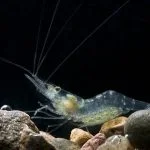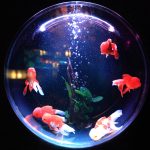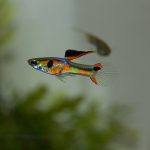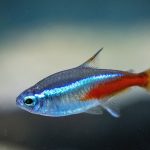A Beginner’s Guide to Cichlids: Types, Care, and Tank Requirements
Introduction
Cichlids are a diverse and vibrant family of freshwater fish, known for their striking colors and fascinating behaviors. They are popular among aquarium enthusiasts due to their beauty and unique characteristics. However, caring for Cichlids requires some specific knowledge and attention to detail. This Cichlids Care Guide will cover all you need to know to provide your favorite fish with a healthy habitat.
Cichlids Care Guide
Since cichlids are a varied group of fish, different species have different care requirements. Here, we’ll provide a general Cichlids care guide that covers essential aspects applicable to most Cichlid species.
1. Selecting the Right Cichlid Species
LSI Keywords: Different Cichlid species, Choosing the right Cichlids, Suitable Cichlid breeds
Prior to aquarium setup, it’s important to choose the appropriate Cichlid species based on your tastes and degree of knowledge. Some species are more aggressive and require experienced caretakers, while others are peaceful and easier to handle for beginners. Before selecting a choice, conduct in-depth study to learn the traits of each species.
2. Creating the Ideal Habitat
LSI Keywords: Cichlid tank setup, Ideal aquarium for Cichlids, Creating a natural habitat for Cichlids
Cichlids thrive in an environment that closely resembles their natural habitat. Provide a spacious aquarium with plenty of hiding spots, rocks, and driftwood. The substrate should mimic their native environment, and a mix of sand and small rocks is usually ideal. Ensure the tank has proper filtration and maintain stable water parameters to keep your Cichlids healthy and happy.
3. Water Quality and Parameters
LSI Keywords: Maintaining water quality for Cichlids, Ideal water parameters for Cichlids, Water testing for Cichlid aquarium
Your cichlids’ health is dependent on the water in their tank. To ensure they are within the recommended range, often check the pH, ammonia, nitrite, and nitrate levels in the water. Perform partial water changes regularly to keep the water clean and maintain stable water conditions.
4. Feeding Your Cichlids
LSI Keywords: Cichlid diet, Best food for Cichlids, Feeding schedule for Cichlids
Cichlids are omnivores and have diverse dietary needs. Offer them a balanced diet that includes high-quality pellets or flakes, supplemented with occasional live or frozen foods like brine shrimp or bloodworms. Be mindful not to overfeed them, as it can lead to health issues.
5. Understanding Cichlids’ Behavior
LSI Keywords: Cichlid aggression, Cichlid territorial behavior, Cichlid social interactions
Cichlids are known for their territorial and sometimes aggressive behavior, especially during breeding. Provide ample space and hiding spots to reduce conflicts between tank mates. Observe their interactions and make necessary adjustments if any fish seem stressed or bullied.
6. Cichlid Tank Mates
LSI Keywords: Compatible Cichlid tank mates, Choosing Cichlid tank companions, Peaceful Cichlid tank communities
When selecting tank mates for your Cichlids, ensure they are compatible in terms of size, temperament, and habitat requirements. Avoid mixing aggressive species with peaceful ones. Some Cichlids prefer to live in pairs or groups, while others thrive as solitary fish.
7. Caring for Breeding Cichlids
LSI Keywords: Breeding Cichlids, Cichlid mating behavior, Raising Cichlid fry
If you plan to breed Cichlids, understanding their mating behavior is essential. Provide suitable spawning sites, such as flat rocks or caves, and allow the parents to care for the fry initially. However, in some cases, you may need to separate the fry to ensure their survival.
8. Recognizing and Treating Common Cichlid Diseases
LSI Keywords: Cichlid health issues, Identifying Cichlid diseases, Treating sick Cichlids
Like all living creatures, Cichlids can be susceptible to various diseases. Look out for signs of illness, such as loss of appetite, abnormal swimming behavior, or physical symptoms. Quarantine new fish before adding them to your main tank to prevent the spread of potential diseases.
9. Keeping Cichlids Happy and Enriched
LSI Keywords: Cichlid enrichment, Mental stimulation for Cichlids, Toys for Cichlids
Cichlids are intelligent and curious fish that benefit from mental stimulation. Provide toys, floating plants, and other enrichments to keep them engaged and prevent boredom. Rotate the enrichment items regularly to maintain their interest.
10. Handling Cichlid Tank Maintenance
LSI Keywords: Cichlid tank cleaning, Routine aquarium maintenance, Managing Cichlid tank
Maintaining a clean and healthy aquarium is crucial for your Cichlids’ well-being. Perform regular tank cleaning, water changes, and filter maintenance to ensure a stable and safe environment for your fish.
11. Dealing with Cichlid Aggression
LSI Keywords: Managing aggressive Cichlids, Reducing Cichlid aggression, Cichlid aggression triggers
Sometimes, Cichlids may exhibit aggressive behavior towards other fish in the tank. Address aggression issues promptly by rearranging the tank layout, providing more hiding spots, or isolating overly aggressive individuals.
12. Recognizing Cichlid Gender Differences
LSI Keywords: Identifying male and female Cichlids, Cichlid sexual dimorphism, Cichlid breeding readiness
Distinguishing between male and female Cichlids can be essential, especially if you plan to breed them. Research the specific gender differences of your Cichlid species to avoid potential mating-related conflicts.
13. Creating a Natural Environment for Cichlids
LSI Keywords: Natural Cichlid tank, Mimicking Cichlid habitat, Setting up a biotope aquarium
Emulating a natural environment in your aquarium can significantly benefit your Cichlids’ health and happiness. Use native plants, rocks, and decorations that resemble their natural habitat to create a biotope setup.
14. Avoiding Common Mistakes in Cichlid Care
LSI Keywords: Cichlid care errors, Common Cichlid care mistakes, How to avoid Cichlid care pitfalls
Mistakes in Cichlid care can have adverse effects on their well-being. Learn from experienced hobbyists and reputable sources to avoid common pitfalls and ensure you provide the best care possible.
15. Handling Cichlid Health Emergencies
LSI Keywords: Emergency care for Cichlids, Treating sick Cichlids, Cichlid first aid
Despite your best efforts, Cichlids may encounter health emergencies. Prepare a well-stocked first aid kit and be ready to quarantine and treat sick or injured fish promptly.
FAQs (Frequently Asked Questions)
Q: How often should I feed my Cichlids?
A: For adult Cichlids, feed them 2-3 times a day in small portions. Avoid overfeeding to prevent health issues.
Q: Can I keep Cichlids with other fish?
A: Yes, but it depends on the species. Choose compatible tank mates to ensure a peaceful community.
Q: How can I tell if my Cichlids are breeding?
A: Breeding Cichlids often exhibit increased territorial behavior, cleaning surfaces for spawning, and aggressive mating dances.
Q: Should I use tap water in my Cichlid aquarium?
A: Tap water can be used, but it must be treated to remove chlorine and chloramines. Consider using a water conditioner.
Q: How do I prevent Cichlid aggression in my tank?
A: Provide ample hiding spots and territories, rearrange the tank layout, and avoid overstocking to reduce aggression.
Q: What should I do if my Cichlids show signs of illness?
A: Quarantine the sick fish immediately, observe them closely, and consult a knowledgeable fish veterinarian if necessary.
Conclusion
Caring for Cichlids can be a rewarding and enjoyable experience when done right. By following this comprehensive Cichlids Care Guide, you’ll be well-equipped to provide your fish with a healthy and happy home. Remember to consider each species’ specific needs and behaviors, and always prioritize the well-being of your aquatic companions.
Remember, a well-maintained aquarium is not just beneficial for your Cichlids but also a beautiful addition to any living space. Happy fishkeeping!




